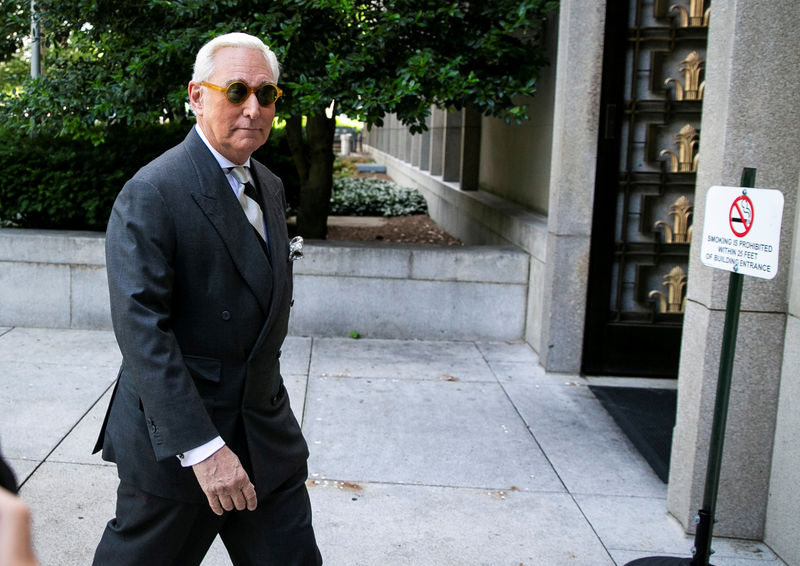By Sarah N. Lynch
WASHINGTON (Reuters) - Federal prosecutors on Thursday accused U.S. President Donald Trump's former political adviser Roger Stone of violating a court-imposed media gag order by posting comments on social media about Special Counsel Robert Mueller's investigation.
In a court filing with the U.S. District Court for the District of Columbia, prosecutors accused Stone of trying to "fan the flames," and poison the jury pool ahead of his November trial, and asked the judge to hold a hearing to consider changing his conditions of release.
"Stone's posts appear calculated to generate media coverage of information that is not relevant to this case but that could prejudice potential jurors," they wrote, saying the posts relate to his claims that Russia did not hack Democratic computer servers in the 2016 presidential election.
Attorneys for Stone, who are also subject to the court's media gag order, could not be immediately reached for comment.
The request by the government could potentially land Stone behind bars, and news of his posts this week were not likely be well-received by Judge Amy Berman Jackson.
In February, Jackson ordered Stone to stop publicly speaking about the case after he had posted a seemingly threatening photo of her next to the image of gun crosshairs on his Instagram account.
In that hearing Stone tried to apologize, saying the posting was not intended as a threat.
But a visibly angry Jackson said his apology "rings quite hollow" and warned him he would not have a second chance if he failed to abide by her order.
Stone is one of 34 individuals who were snagged as part of Special Counsel Robert Mueller's probe into Russian interference in the 2016 U.S. election.
He has pleaded not guilty to charges of making false statements to Congress, obstruction of justice and witness tampering.
Mueller concluded his probe in March. His report documented multiple points of contact between Trump campaign's and Russia, but he could not establish evidence of a criminal conspiracy.
Stone has repeatedly bashed Mueller's investigation, and also questioned whether Russians actually hacked Democratic emails.
Prosecutors, in their filing on Thursday, said Stone posted comments on June 18 and 19 on Instagram that referenced articles including one titled "US Gov't Entire Russia-DNC Hacking Narrative Based on Redacted Draft of Crowdstrike Report."
Stone then tagged the post and asked "But where is the @NYTimes? @washingtpost? @WSJ? @CNN?"

Stone also posted other articles that expressed skepticism of Mueller's probe, and questioned why mainstream media outlets were not covering the developments.